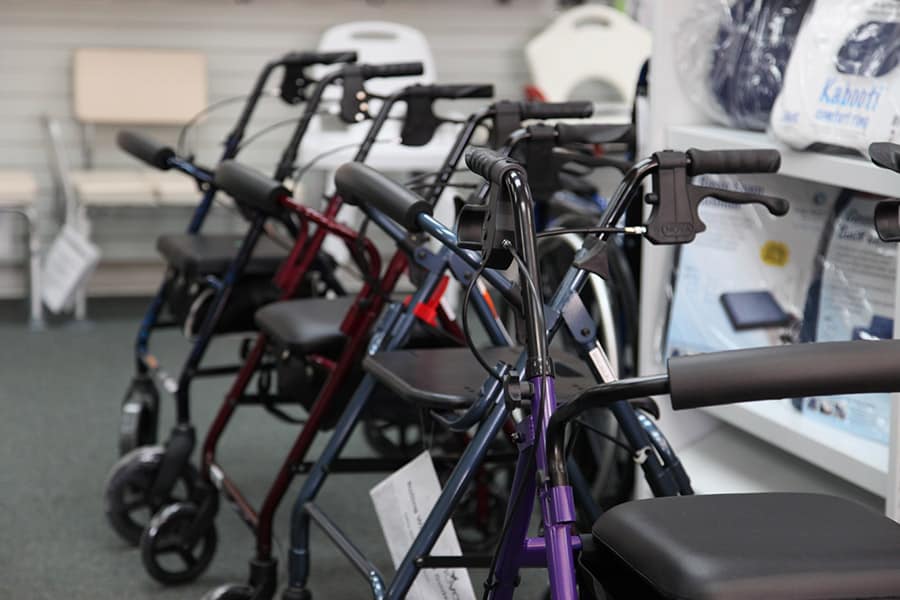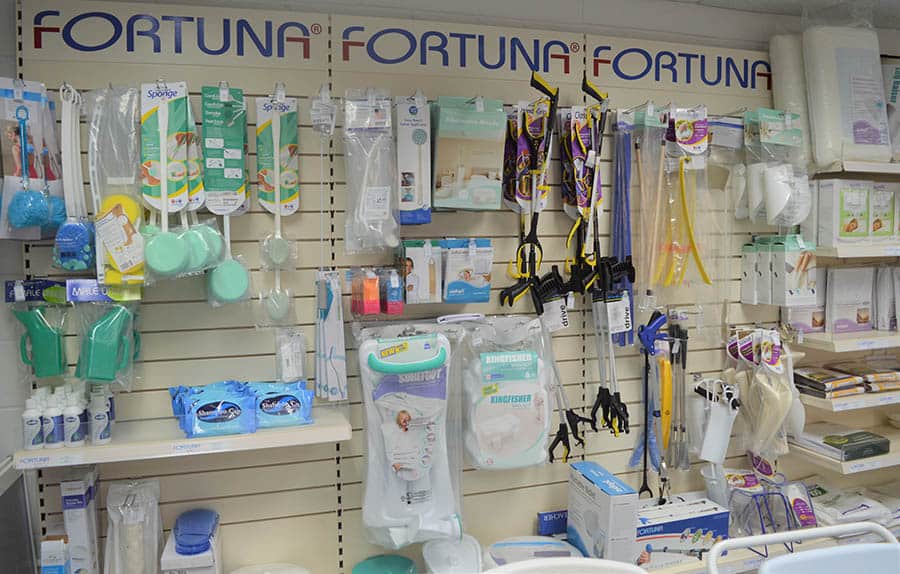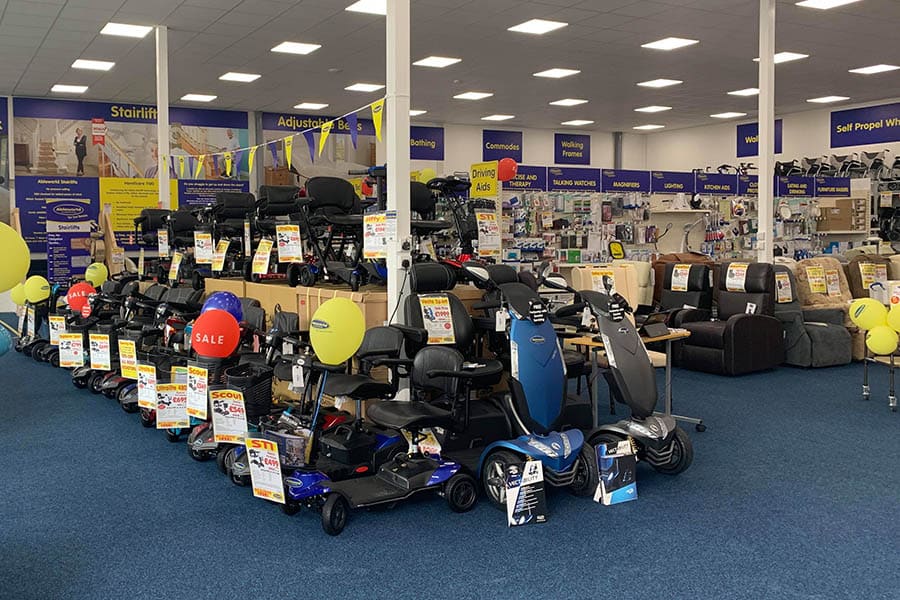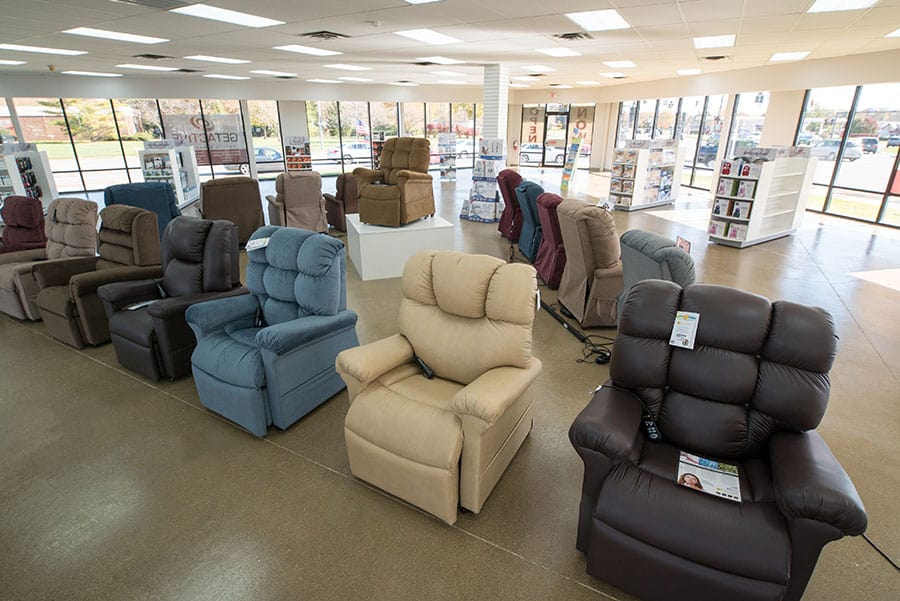DEEP DIVE: The pandemic, mobility retailers and product portfolios

With the coronavirus outbreak curtailing sales just ahead of the industry’s busier spring and summer trading season, big-ticket items such as mobility scooters may be off end-users’ shopping lists in the short-term.
Despite demand sharply declining, however, it has not disappeared completely. THIIS spoke to mobility retailers to discover which products are still selling during the crisis and consider the benefits and disadvantages of having a diverse product portfolio.
The mobility, access and independent living is a niche sector, however, there is still a broad spectrum of products and services across the market. From big-ticket items such as rise and recline chairs, stairlifts, adjustable beds, mobility scooters and complex powerchairs through to smaller and lower-end products such as aids to daily living and continence care ranges, the sector has a wide array of products to meet the needs of customers.
For all mobility retailers, this means making the decision of which products and brands to stock and sell.
Deciding on which products to offer can vary depending on the company’s overall business strategy, goals and objectives. It could be a desire to distinguish themselves in the high-end segment of the mobility market, offering premium products and more exclusive brands. For others, it may be a focus on a specific product category, such as stairlifts, to become known as the experts in the field. Alternatively, companies may opt to cast the net wide, offering a broad selection of products and services in a bid to become a one-stop-shop in attempt to meet the needs of all customers.
Every strategy has its merits and disadvantages, with the choice being dependant on a range of factors, such as the size of the retail premises, the spending power of local customers and the retail business model.
“For us, being able to sell PPE to the public as well as to local authorities, adult care services, hospices, hospitals, care homes and domiciliary care agencies has allowed us to maintain our turnover while providing valuable resources to the community.” Elaine Ferguson
One element that no company would or could have factored into their strategy, however, was a global pandemic outbreak. In the wake of the crisis and an unprecedented fall in demand, it does raise the age-old question of broad versus core.
Broad benefits
A risky strategy?
For those who support the idea of a broad product offering, the risk of having all eggs in one basket is often cited as the key factor, arguing that an over-reliance on a limited range of products may leave a company vulnerable in the event of a fall in demand for core ranges.
Of course, the unprecedented fall in demand witnessed as a result of the pandemic for key product ranges are extraordinary and hopefully temporarily, however, the pandemic does act as a stark reminder of what can happen when a core product range such as powered mobility equipment stops selling, leaving those that have chosen to specialise in that area with no fallback.
Spreading the risk
The advantage of a broader and more diverse product range is that if the demand for one category falls, the impact can be mitigated by other products in different areas, reducing the overall impact.
For some mobility retailers with broader portfolios, such as London’s largest mobility showroom Fortuna Mobility, this has been the case. Despite the outbreak and lockdown measures, the company has still been selling products such as PPE throughout the crisis.
“Fortuna Mobility is a division of Fortuna Group London Ltd, a leading UK supplier of sundry products to the pharmacy sector,” explained Elaine Ferguson, Mobility Services Manager of Fortuna Mobility.
“Therefore, we have access to existing PPE products such as face masks, thermometers and gloves. However, in these unprecedented times, there have been huge problems with sourcing enough products from our pre-existing suppliers to meet demand. Our Product Development Team has scoured the world to find these and have also added specialist face masks, visors and disposable aprons to our range. We’re finding that across the group these products are selling out almost as quickly as we can obtain them.
“The current situation highlights the importance of mobility retailers ensuring they provide a broad product offering. For us, being able to sell PPE to the public as well as to local authorities, adult care services, hospices, hospitals, care homes and domiciliary care agencies has allowed us to maintain our turnover while providing valuable resources to the community.”

The same is true for other retailers in the sector, such as John Preston Healthcare promoting its ranges of aprons, masks, gels and wipes to help meet the demand across the health and social care system.
Cross-sell and upsell
Alongside reducing the dependence on a limited category of products, a broader range of mobility, access and independent living ranges offer the chance to introduce customers to complementary products.
…it might be a reason to form strategic alliances on a regional basis with other retailers or service companies that can work together…” Alastair Gibbs
Having already done the hard work of getting a customer through the door, a broader range of products means more opportunity to offer more solutions to further meet a customer’s needs whilst also securing more sales.
A company that prides itself on its varied offering is Herefordshire-based mobility retailer TPG DisableAids.
Speaking with Managing Director Alastair Gibbs, he explained the value in his company’s product portfolio strategy: “We have taken the view that no target customer ever has an issue or a problem that can be resolved with just one product range. So, for example, if someone struggles with the stairs and needs a stairlift, they almost certainly will struggle in other areas of daily living as well.
“It may be that they will need help in to or out of bed, in and out of the bath, in and out of a comfortable chair, mobility indoors and outside, etc.
“So our portfolio contains many of the elements to resolve these daily living problems in such a way that we can primarily cross-sell alternatives but crucially be a ‘solutions provider’ rather than just a retailer.”
According to Alastair, being able to suggest and supply complementary products that work alongside one another helps add value to its customers’ retail experience and provides a competitive advantage to the company.
Importantly, Alastair also pointed out that broadening the services a company can offer customers is also a valuable means of being able to continuously engage with customers, building valuable loyalty.
“Added to that we have always had the ability to not only provide and sell products, but to service, repair and install those products for as long as they are needed,” he continued.
“It often amazes me that some retailers see the repair and service function as an annoyance that they would rather not have to deal with. Our view is that it is an opportunity to refresh our acquaintance with that customer and take the lead in observing any change in personal circumstances which may require further products from our portfolio.”
The Herefordshire mobility company has also managed to continue steadily trading throughout the crisis, with its broader offering helping to cushion the blow from the fall in demand for powered mobility ranges.
In particular, Alastair cites LOLER testing, rise and recline chairs and stairlifts as still having consistent demand despite the crisis, largely driven by local authorities investing in equipment designed to keep in the community and out of hospital.
“Outdoor mobility may be down for now but there are plenty of opportunities to continue to provide a service to our customer base in supplying what is required, where it is required and in a timely fashion,” he added.

Core competency
Undoubtedly, having a broad and diverse product offering has its advantages but it does not come without its own potential drawbacks that mobility retail leaders must consider before running off to add new product lines to the shelves.
The 80/20 rule
A concept many marketers and business leaders will be aware of, the 80/20 rule – also referred to as the Pareto principle – is the notion that a small proportion of an overall product range will account for a large percentage of total revenues.
Discussing the impact of the pandemic on product demand with Duncan Gillett, MD of Clearwell Mobility, he explained that despite the company having a broad range of products, such as continence care, it is the larger motorised mobility ranges which account for up to 60 per cent of sales – a situation largely seen across the industry.
Arguably, even if the products in that 80 per cent are still selling, it’s the core 20 per cent of a company’s offer that ultimately sustains a business.
Space is at a premium
A broader product offering also means stocking and showcasing more products and to do this means more space on shelves, in storerooms and in warehouses, as well as tying up more capital in stock.
For many operating retailers in the sector who operate in relatively small high street facilities, shelf and floor space is at a premium.
A company well-known for offering one of the widest range of products in-store in the sector is Ableworld, the UK’s largest mobility retailer.
Importantly, the company’s entire retail model has been built around the idea of offering a comprehensive selection of products at competitive prices, leading the company to regularly opt for large stores over 3,000 sq. ft to accommodate its substantial portfolio.
Speaking with the retailer’s Managing Director Mike Williams, he pointed out that for companies looking to focus on offering a wide selection of solutions, the companies need to be geared up to operate in such a way.
“It’s something Ableworld has always done; it is the model we offer,” he explains.
“I’m certainly hoping we don’t see this situation again in our lifetime so whether others change their model because of the crisis is yet to be seen. In the main, they would have to do it away from the high street and put a much larger stock investment into their stores.”
Low cost, low margin, high competition
For those deciding to stock a broad range of products in this sector, such as lower cost aids to daily living or continence range, there is the added pressure that along with taking up valuable space, these products generally tend to offer lower margins and come with lots of competition, particularly with the rise of the internet.
These lower-cost items require less knowledge to sell and less commitment to buy, which means higher price sensitivity and fewer barriers to entry for competitors willing to sell cheaper.
This means tightly and effectively managing costs becomes critical in order to remain competitive as price becomes the deciding factor between securing a sale or not.
High costs, high margins, high barriers to entry
Alternatively, diversifying into product areas and services that can yield higher margins will likely have higher setup costs associated with entering that particular market.
For example, a retailer specialising in powered mobility products that decides to expand into the installation and maintenance of stairlifts might be required to invest in experienced engineers, stocking spares, adapting or buying in new IT systems, as well as the cost of acquiring customers from established competitors.
Such high set-up costs to enter a new segment of the market can often be prohibitive for many companies and comes with its own degree of financial risk, should the venture not prove a success.
The concern of di-worse-ification
Deciding to make the move into a new area may end up taking valuable time, effort and resources away from the core business that the company may be best known for.
The history books are filled with tales of companies that attempted to diversify, be it through setting up new ventures organically or buying into a market through acquisitions, only to fail to adapt to the needs and requirements of the market.
Not only does the new venture fail but also the core business suffers, as well as potentially eroding the strong reputation a company may have built in a specific area.
In the mobility retail sector, examples such as Rapid Solicitors’ ill-fated endeavour to secure a nationwide network of licensed mobility stores in 2011 stands as a stark reminder of the realities of diversifying away from the core business.

Broad or core
As is so often the case, there is no right or wrong strategy. For those with a desire to move into new areas, such as mobility stores interested in offering wet room conversions or stairlifts, but lacking the capital to invest into entering that segment of the market, the answer may lie in collaborations.
Power partnerships
The industry is no stranger to cooperation that already happens widely across different segments, be it working with private occupational therapy practices such as Stuart Barrow’s Promoting Independence on joint assessments.
Some suppliers of specific ranges also have operations designed to work with retailers on a referral and commission basis with attractive rates, such as Handicare’s Companion arm. For dealers, this route offers the benefits of providing new revenue streams without the significant set up costs.
Going beyond retailer/supplier relationships, however, the crisis has also given rise to mobility retailers looking at ways to work with other retailers to mutually support each other.
Reflecting on the idea of working with others in the industry, TPG DisableAids Alastair said: “I am not suggesting this is a route for all mobility outlets to undertake themselves, but it might be a reason to form strategic alliances on a regional basis with other retailers or service companies that can work together to provide what the customer wants.”
The idea of coming together throughout the crisis and working with others is also championed by Darren Macey, Business Development Manager of Lifestyle and Mobility.
“It’s important that we all stick together and work together through this. Graham Johnson from Ability Plus and I have been in close communication since COVID-19 outbreak started,” he explained.
“We set up a WhatsApp Group for all mobility retailers to join. It’s a place where all competitors are trying to help support each other out at these tough times.
“There have been discussions such as insurance pay-outs, how Motability can support us in the way of grants, furloughing staff, as well as general ideas on how we can all support each other as much such in regards to out of stock items, parts etc.”
The coming together of retailers is an interesting step and one that may continue long after the pandemic is over as companies consider specialising in areas where they are strongest, lending support to retailers that may not have the same competency in that area and vice versa.
Time remains to be seen whether the coronavirus will have a long-term impact on retailers’ product portfolio strategies but what the pandemic has given many retailers is the opportunity to stop and think if their current strategy is working for them.
As the industry comes out the other side of the crisis, however, a more collaborative approach across the entire retail sector may well be on the cards.
https://thiis.co.uk/deep-dive-the-pandemic-mobility-retailers-and-product-portfolios/https://thiis.co.uk/wp-content/uploads/2020/05/Product-portfolio-rollators-shop.jpghttps://thiis.co.uk/wp-content/uploads/2020/05/Product-portfolio-rollators-shop-150x150.jpgCoronavirus NewsCOVID-19 Trade NewsIndustry Deep DivesNewsroomRetailer NewsTrade FocusTrade NewsAbleworld,access,adjustable beds,adult care services,care homes,Clearwell Mobility,complex powerchairs,coronavirus,demand,Fortuna Mobility,hospices,hospitals,lifestyle and mobility,local authorities,outbreak,PPE,product portfolios,rise and recliners,SKUs,Stairlifts,strategy,TPG DisableAidsWith the coronavirus outbreak curtailing sales just ahead of the industry’s busier spring and summer trading season, big-ticket items such as mobility scooters may be off end-users’ shopping lists in the short-term. Despite demand sharply declining, however, it has not disappeared completely. THIIS spoke to mobility retailers to discover which...Calvin BarnettCalvin Barnettcalvin.barnett@bhta.comAuthorTHIIS Magazine

